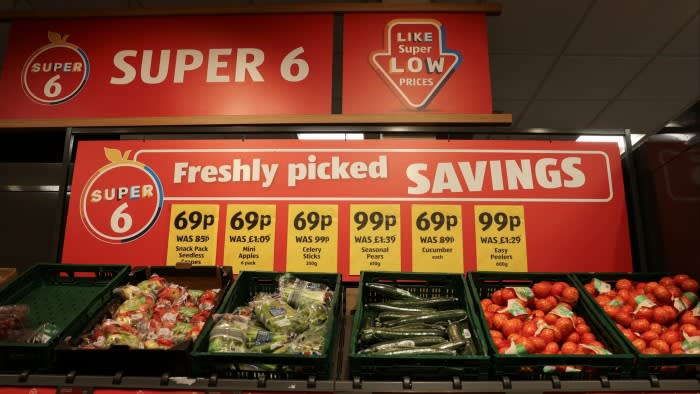Unlock the Editor’s Digest for free
Roula Khalaf, Editor of the FT, selects her favourite stories in this weekly newsletter.
Flogging fruit and flights are two very different businesses. But there are similarities between budget airlines such as Ryanair and the German discount supermarkets Aldi and Lidl. After entering the British market (in the case of the latter in the 1990s), both shook up their respective industries beyond recognition.
The budget airlines have now reached maturity: Ryanair became a regular dividend payer for the first time last year. Several indicators suggest maturity is also approaching for the British arms of the discount supermarkets.
But just as with cut-price airfares, reaching “peak Aldi” (or indeed Lidl) will not mean the influence of the discount grocers is diminished.
One sign of a peak approaching is that Aldi’s market share in Britain slipped to 9.9 per cent in the 12 weeks ending September 1, even though spending through its tills rose 1.3 per cent year on year. Around the same time last year, Aldi’s share of the British grocery market was 10.1 per cent, according to Kantar.
That has not weakened its appetite for further expansion: Aldi said on Monday it would open a further 23 British stores in 2024, on top of the 12 already opened this year, taking its total to about 1,050. That came after it posted a 16 per cent improvement in annual sales to a record £17.9bn in 2023.
Despite the continued openings, the company’s focus seems to be shifting to profitability, a classic hallmark of a maturing businesses. Store efficiencies helped drive a near 2 percentage point increase in Aldi’s operating margin to 3.1 per cent, edging closer to the industry average of 4 per cent.
Finding additional sites must be tougher. Most of the best-performing retail sites already have an Aldi or Lidl within a 10-minute drive, said Robert Abraham, managing director at Atrato, the investment adviser to the Supermarket Income Reit.
There are still factors helping the discounters. Asda and Morrisons, weighed down with debt, continue to struggle. Lidl has continued to gain share this year, said PwC’s Kien Tan.
Fundamentally, the largest listed grocers have become much more adept at dealing with the upstarts. Tesco and Sainsbury have Aldi “price match” pledges, in addition to popular loyalty schemes. Both have plenty of firepower to continue battling the discounters on price if necessary.
Tesco, whose shares have gained 41 per cent in the past 12 months, is guiding to as much as £1.8bn of free cash flow from its retail operations for 2024-25, even if that is slightly down on £2bn the previous year.
Ryanair’s coming of age has not diminished its role as the sector nuisance for Europe’s legacy carriers. Cut-throat competition among British grocers will continue, but it is heading into a new era.


